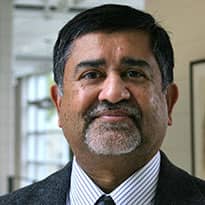There is even a careful thesis on how the Bhagavad Gita influenced Thoreau, and Dr. Desai could have downloaded it on Kindle for a sum of less than ten dollars. In his book, The Gita within Walden, author Paul Friedrich unpacks the connections between these two spiritual classics, Henry David Thoreau's Walden and the Bhagavad Gita. It is said, and there is evidence, that Thoreau took the Gita with him when he moved to Walden Pond. Friedrich argues that Walden and the Gita have "much in common, touching on ultimate ethical and metaphysical questions."
In both books, Walden and the Gita, according to Friedrich, the "fundamental problems of good and evil, self and cosmos, duty and passion, reality and illusion, political engagement and philosophical meditation, sensuous wildness and ascetic devotion" are pondered. Reviewing Friedrich's book, Steven Schroeder observes that in each case (Walden and the Gita), ". . . the poet is a seer, and 'seeing' is a matter not just of the eyes but of the whole body, the whole body of the text, the whole body of a world embodied in text that is self-consciously . . . marked . . . by the interplay of uniqueness and antecedent sources." Thoreau too realizes, just like in the Gita, "violence is bad, but social evil is worse."
Schroeder finds Friedrich's reading of the Gita and the Walden, correct, careful, and sensitive, and " . . . as Gandhi and King would both insist . . . social evil is violence." Social evil is radical violence in the sense that it penetrates to the root of humanity and the violence it breeds will have to be confronted rather than people "simply succumbing to it." This is what Thoreau, Gandhi, and King realized and this is why Lord Krishna warns Arjuna about shutting his eyes to social evil. He tells Arjuna that you cannot afford not to tackle social evil just because it means that you may have to use violence—even using violence against your own kith and kin, if indeed they are the perpetrators of social evil.
Michel Danino too cautions us about the discussion of violence in the Gita, and asks us to think carefully: "The Gita's answer is 'spiritual works.' This means, first, no egoism in our action, no expectation of any gain or reward. . . . Not so easy in practice, yet a most soothing way to admit that our intellect is simply incapable of gauging the workings of the universe. We may erect systems of philosophy and speculate forever, but in the end we cannot know what is really good or bad, right or wrong. We remain pitifully ignorant of what we are or who we are, why we do what we do, and whether our action is of any use at all, or just some passing ripple on the great ocean of life. . . . But 'spiritual works' also means that we must surrender our petty limitations and unite our consciousness with the Divine consciousness in the very midst of action. This surrender to oneness with the Divine vision and action is the cornerstone of the Karmayoga of the Gita. It asks us to be 'with our consciousness founded in the Self, free from desire and egoism'."
Danino has tackled what may seem to some, including the glib Dr. Desai, as well as to Prof. Wendy Doniger, an advocacy of violence in the Gita. The Gita, he reminds us, is not a simplistic and superficial treatise. There are no simple oppositions—good/bad, just/unjust, violence/nonviolence—but to "the Gita the truth is neither one nor the other, but the conscious use of force to protect dharma. This third way is both a noble and a practical solution." Till such time "soul force" can be used to thwart the evil designs of murderous jihadis, for example, what should good people do? That is the fundamental question in the Gita, and Lord Krishna is giving courage to a man who at the point of doing battle is overcome with queasiness about tackling evil.
Alas, for the glib economist it seems that sensing, sense-making, and sensitivity have become alien, and thus, at least going by the media accounts, he has become illiterate too in matters of the grandly spiritual and philosophical.
Did Lord Desai do his homework before he decided to pontificate in a pugnacious way, imitating the other and more well-known British atheist, Richard Dawkins, on the Bhagavad Gita? Dawkins at least has had the wisdom to keep away from Hindu texts and philosophy in his attacks on religion, tackling only Christianity because he is most comfortable and knowledgeable about the history of Christians and their use of the good book to make tall claims. But where the good scientist feared to tread, the pretentious "social scientist" tramples all over the place. Listen to Lord Desai at your own peril. Meanwhile, read the Bhagavad Gita carefully, thoughtfully, fully and come to understand the challenges of being human, of being good, of acting without desiring the fruits thereof.





